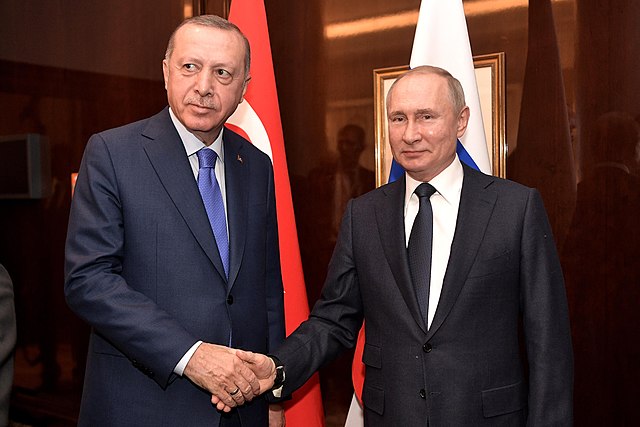‘Authoritarian’ Turkey must take precedence over Russia, China in NATO summit – analyst
kremlin.ru, CC BY 4.0 <https://creativecommons.org/licenses/by/4.0>, via Wikimedia Commons
During Monday’s NATO summit, members of the alliance will most likely discuss, among other things, how they can deal with challenges posed by authoritarian powers like Russia and China. However, they must first deal with Turkey, an authoritarian state within NATO, wrote Blaise Misztal in The National Interest on Sunday.
Throughout his 19 years in power, Turkish President Recep Tayyip Erdoğan convinced three U.S. presidents that his country was “crucial to achieving U.S. interests in the Middle East,” wrote Misztal, vice president for Policy at the Jewish Institute for National Security of America (JINSA).
The Bush, Obama, and Trump administrations consequently came to believe that Erdoğan was a valuable partner for everything in the Middle East, from democracy promotion, helping fight the Islamic State, and countering Iran.
In reality, Misztal argues, Erdoğan moved Turkey “further away from, and often even into direct confrontation with, the United States and NATO.”
He cited Turkey’s actions in 2020 as recent examples. During that year, Turkey violated the Libyan UN arms embargo and harassed a French navy ship trying to enforce it. It also made forceful claims to Greece’s territorial waters, resulting in military standoffs between the two NATO members. And it tested its Russian S-400 air defence missiles systems in complete disregard of strong U.S. opposition.
Erdoğan undertook such provocations on the foreign front while clamping down on his political opponents, the press, and social media at home, Misztal wrote.
Previous U.S. administrations had hoped that by remaining largely silent on such issues, they could enlist Turkey’s cooperation in other areas. That never worked, and Erdoğan “is looking to pull off the same trick again,” Misztal wrote.
The Turkish president is now portraying his country as an indispensable ally for any U.S. effort to counter Russian and Chinese influence. As proof, Erdoğan’s Turkey points to its recent battlefield successes against Russian-backed forces in Syria, Libya, and the Nagorno-Karabakh, where it supplied the victor Azerbaijan with armed drones, and its sale of armed drones to Ukraine and Poland.
“Ankara has even started arguing to American experts that it could offer an alternative to Russian and Chinese influence in Central Asia, using its ethnic and linguistic ties there,” Misztal wrote.
While Turkish overtures could be tempting to U.S. President Joe Biden, Misztal insists that Turkey’s “own actions belie its claims to be a partner against Russia and China.”
Not only did Turkey undermine NATO’s collective defence by procuring Russian weapons systems, he argues, but a mere two weeks ago, it blocked NATO sanctions and a strong condemnation of Russian ally Belarus over its diversion of a civilian airliner to arrest a dissident journalist. Furthermore, Turkey is actively appeasing China’s persecution of ethnically Turkic Uighurs by deporting Uighur refugees in Turkey to China.
Despite all of this, Misztal still believes it might be “worth testing whether Turkey’s offer of cooperation is sincere or self-serving.”
Consequently, he argues that Monday’s NATO summit, where Erdoğan and Biden will meet for the first time since the latter was elected president, “should present Turkey with a serious, and consequential, choice.”
Misztal believes that coordination with other NATO members and the formation of a “common approach to Turkey” is essential since Turkey’s S-400s and its recent actions in the Eastern Mediterranean are a threat to both NATO unity and European security.
“If U.S. and other NATO partners’ interests remain overlapping but misaligned, no country is likely to achieve even its second- or third-best outcomes with regards to Turkey,” he wrote.
Misztal argues that Biden should emphasize that Turkey’s S-400s is the greatest concern for NATO and should also be prepared to pressure Turkey on other issues such as migration.
In return for concessions from Ankara, such as resolving the S-400 issue to NATO’s satisfaction, Misztal suggests that the alliance “could offer to work with Ankara on supporting Ukraine, peacefully resolving the conflicts in the South Caucasus, and minimizing Russia’s role in Libya and Syria.”
In return for Turkey willingly de-escalating tensions in the Eastern Mediterranean, the U.S. could also “facilitate a dialogue between Turkey, Israel, and Egypt on marketing their gas to Europe,” Misztal wrote.
“Simultaneously, Erdoğan should understand that the alternative to cooperation with NATO will be alienating the entire bloc,” he added.
Misztal also suggested that NATO create mechanisms to censor or even oust alliance members that don’t abide by NATO’s democratic principles or act in ways that weaken the collective security of the alliance. He also advocates NATO strengthening its partnership with other regional states like Cyprus and Israel.
“NATO cannot successfully confront external threats with autocratic spoilers inside the alliance,” he concluded. “Erdoğan should be presented with a clear choice between cooperation or relegation.”
Originally published in Ahval

